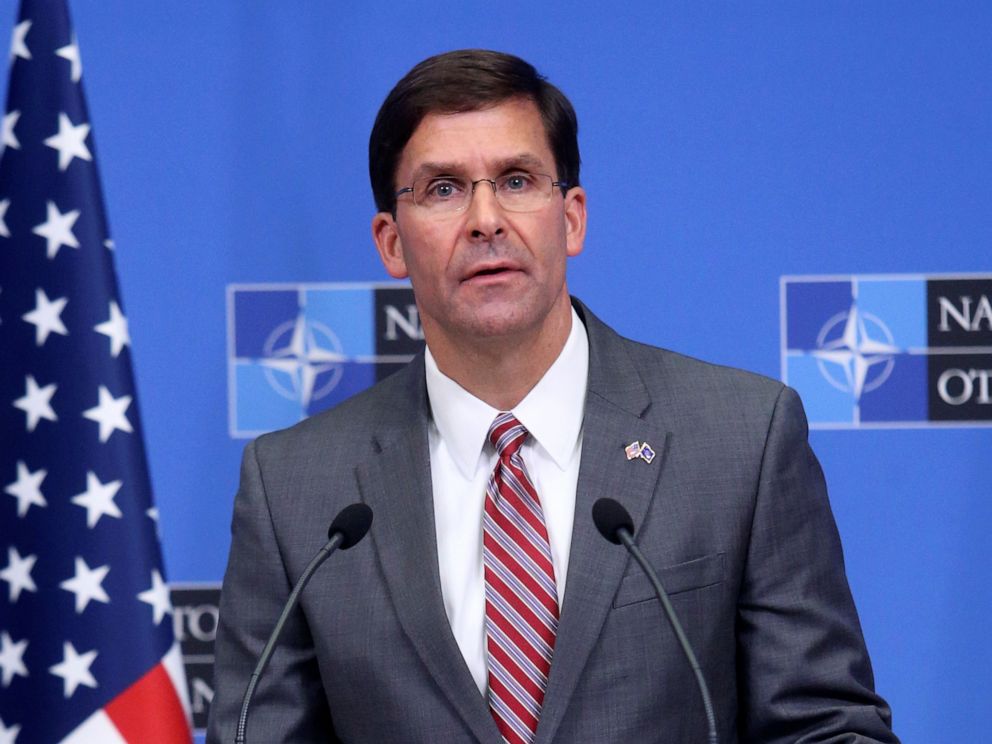Acting Defense Secretary urges allies to condemn Iran, join maritime security effort to protect Strait of Hormuz
Mark Esper will return to Brussels in mid-July to brief NATO allies on Iran.
Acting Defense Secretary Mark Esper urged European allies on Thursday to publicly condemn Iran's actions and join a new U.S.-proposed maritime security effort to protect the Strait of Hormuz, after a series of attacks on tankers and the shoot down of a American drone in that strategic waterway. His comments come as Iran is expected to breach the agreed upon cap on its enriched uranium stockpile.
During a news conference at the NATO Defense Ministerial in Brussels, Esper said he asked allies to join a coalition of "like-minded countries" that would support freedom of navigation in the Strait of Hormuz through "broader maritime surveillance."
"And that should include air surveillance all the way up to a picket line of ships to help protect the international waterways and to include maybe even escorts," Esper said. "We have to flesh it out on our end, and we'll see what makes the most sense."
Esper, who stepped into the role of acting Pentagon chief only on Monday, also announced that he would return to Brussels in mid-July to give allies a more detailed briefing "on the history of this Iranian threat."

Secretary of State Mike Pompeo made a similar pitch for a maritime coalition to U.S. allies in the Middle East this week with the State Department dubbing the proposed mission the "Sentinel program." The project would include around 20 countries, Pompeo said on Monday.
But it's unknown if any countries in Europe or the Middle East have firmly committed to such a coalition. Saudi Arabia did not mention the idea in a readout of Pompeo's meeting with King Salman and Crown Prince Mohammed bin Salman, although the U.S. readout said they discussed "the need for stronger maritime security."
A senior State Department official described the coalition as military and commercial ships serving in an observer role in the Gulf with cameras and binoculars, but not actually escorting tankers.
Top administration officials have stressed the need for Asian nations, many of whom receive the vast majority of oil from the Gulf, to be part of an international response to Iran's aggression in the region. The topic is expected to come up at the G20 Summit in Japan this weekend.
At NATO, Esper reiterated that the U.S. does not seek war with Iran and wants to bring Tehran to the negotiating table -- an action Iranian leadership has so far refused, citing distrust of Washington and its tough sanctions on Tehran.
"Our strategy is at its core an economic and diplomatic one," Esper said, before adding that "no one should mistake restraint for weakness."
The NATO ministerial comes as Iran's Foreign Minister Javad Zarif tweeted that U.S. sanctions "aren't alternative to war; they ARE war," and that "negotiations and threats are mutually exclusive."
Last week, Iran vowed to breach the cap on its enriched uranium stockpile that was agreed to under the 2015 nuclear deal by Thursday. A spokesperson for the United Nation's nuclear agency, which monitors Iran's program, declined to comment to ABC News on whether Iran had done so. But an anonymous diplomat at the agency told Reuters that Iran hadn't reached the limit yet and was "more likely" to do so "at the weekend if they do it."
The U.S. has been criticized by European partners for exiting the nuclear deal with some blaming the U.S. sanctions for why Iran is lashing out. But Esper defended the U.S., saying the country was "by no means the instigator of recent tensions in the Strait of Hormuz."
"Iran's hostile actions are an international problem that affects many nations," he said, adding later, "We've had at least six ships attacked by Iran or its proxies. We've had mortar attacks into Saudi Arabia. We've had a cruise missile attack on Saudi Arabia. We of course had the shoot down of our unarmed aircraft in international airspace and the list goes on."
President Donald Trump has said he intends to nominate Esper to the role of defense secretary permanently. Esper previously served as Army Secretary and as a chief lobbyist for Raytheon.




